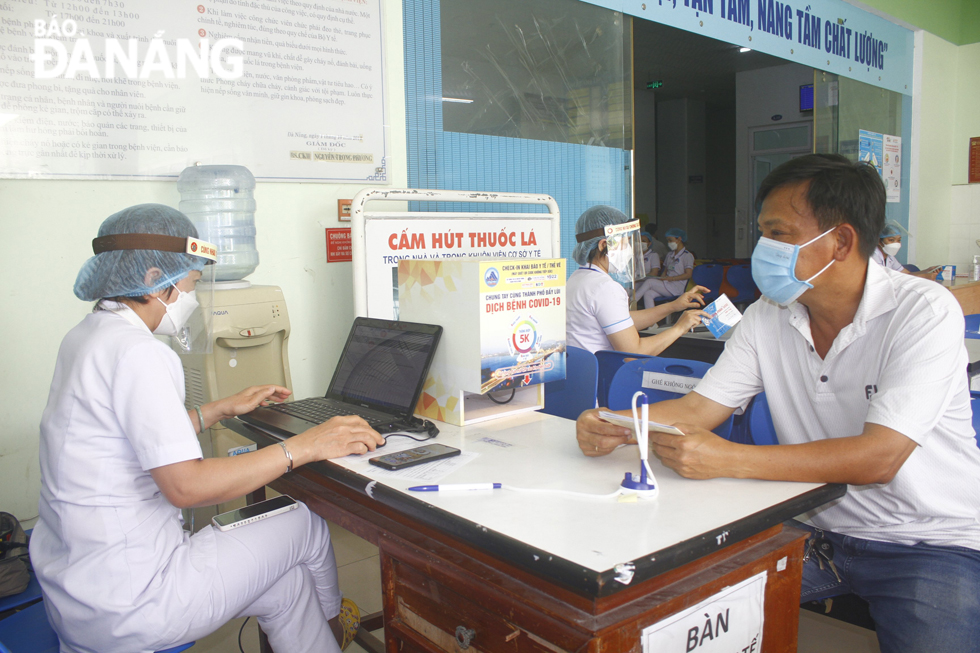Chip-based citizen identification cards used for medical examination, treatment
Currently, people only need to use chip-based citizen identification (ID) cards to receive medical examinations and treatment instead of carrying health insurance cards as well as identification documents. This is an activity being piloted at medical facilities in Da Nang towards simplifying documents, minimizing the time to perform medical procedures for patients as well as meeting the practical benefits of patient management at medical facilities.
 |
| People register for medical examination and treatment by using their citizen ID cards at the Hai Chau District Health Center. Photo: PHAN CHUNG |
Since March, Hai Chau District Health Center has piloted medical examination and treatment using chip-mounted citizen ID cards. This is one of the first medical facilities in the city to pilot this activity under the guidance of the Ministry of Health and Social Insurance of Viet Nam.
Accordingly, instead of presenting their health insurance cards and identification papers, patients now only need to present their chip-based citizen ID cards. After that, medical staff scan the card to enter information and data about the patient's health insurance and then guide the next medical examination and treatment steps.
According to Dr Nguyen Trong Phuong, Director of Hai Chau District Medical Center, the implementation of using chip-based citizen ID cards in medical examination and treatment brings numerous conveniences to people, reducing procedures and related documents, shortening the time and not having to go through complicated procedures for re-issuance.“However, some people currently do not know much of this information or insurance data has not been integrated into their citizen ID cards.
Therefore, medical staff at the reception counter have to inform and propaganda to patients, in tandem with carrying out two methods in parallel, that is, using chip-based citizen ID cards or performing traditional medical examination and treatment procedures, " said Doctor Phuong.
In the same vein, Doctor Nguyen Thanh Trung, Deputy Director of Da Nang Hospital, said that the unit has now been prepared in terms of human resources and equipment for the implementation of using chip-based citizen ID cards in medical examination and treatment according to the plan of the Ministry of Health and Vietnam Social Insurance. However, the hospital has still deployed solutions in parallel to facilitate and avoid causing trouble for patients in the initial time of application.
According to Mr Pham Quoc Khanh, Deputy Director of the Da Nang Social Insurance, the pilot implementation of using chip-based citizen ID cards in medical examination and treatment not only brings practical benefits to patients but also facilitates patient management in medical facilities.
For the time being, the Viet Nam Social Insurance has cooperated with the Ministry of Public Security to synchronize national insurance data with national population data, share citizen information in the insurance database with the national population database for verification, development of technical solutions to ensure the lookup of information about health insurance cards via chip-based citizen ID cards.
This clearly demonstrates the direction toward modern administration, and digital government, creating maximum conditions for health insurance cardholders in terms of medical procedures.
Recently , the Da Nang Social Insurance has sent an official dispatch to the Department of Health to disseminate this policy to citywide medical facilities, and at the same time widely inform patients, instruct patients to use chip-based citizen ID cards or VNEID application (national electronic identification application of the Ministry of Public Security) when going to medical facilities.
So far, there have been about 560,000 chip-based citizen ID cards synchronized with insurance data (accounting for 56%). Data synchronization is still being carried out by the Ministry of Public Security and Vietnam Social Insurance.
“It should be noted that when going to a medical facility for the first time, patients should bring their health insurance card or smartphone with integrated VSSID application, identification documents having their photos. If the patients have already used chip-based citizen ID cards or VNEID, they only need to present their ID cards or use the VNEID application. In case the chip-based citizen ID card has not yet integrated the health insurance data or the health insurance participant has not been issued a VNEID account, medical staff at the reception counter have to carry out traditional medical examination and treatment procedures," said Mr Khanh.
Reporting by PHAN CHUNG- Translating by T.VY